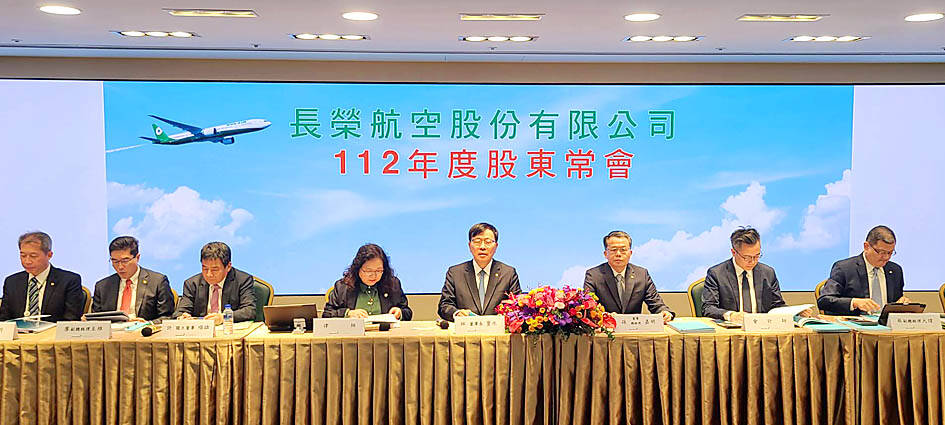EVA Airways Corp (長榮航空) yesterday said its average ticket prices rose by a more-than-expected 50 percent in the first quarter of this year, compared with before the COVID-19 pandemic.
EVA Airways president Clay Sun (孫嘉明) attributed the increase to robust demand for long-haul flights, as well as business-class and premium-economy-class seats, as consumers embraced air travel following the easing of border controls.
Sun made the remarks during the company’s annual shareholders’ meeting.

Photo: Wang Yi-hung, Taipei Times
The number of flights operated by EVA has returned to 75 percent of pre-pandemic levels and might rise to 80 percent next quarter, the airline said.
The number of flights it operates to Europe has surpassed the pre-pandemic level, while those to the Americas and Southeast Asia are still recovering, it said.
EVA expects its revenue this quarter to grow further, after increasing 47 percent annually last quarter to NT$44.42 billion (US$1.44 billion), Sun said.
“Summer vacation will be peak season for the passenger business. We have seen strong bookings for long-haul flights from Taiwan to Europe and the US in July,” he said.
“The booking rate for flights in July has risen to 70 percent. We expect the number to climb to 90 percent in July and August,” he added.
Speaking about the cargo business, Sun said that freight rates have bottomed out.
Demand would rebound if central banks slow down their rate hikes, he said.
EVA shareholders approved a proposal to distribute a cash dividend of NT$0.8 per share.
EVA Airways chairman Steve Lin (林寶水) was re-elected as a board member and chairman, a corporate filing showed.
EVA reported net earnings of NT$4.49 billion in the first quarter, the highest of all time, or earnings per share of NT$0.84, corporate data showed.

US sports leagues rushed to get in on the multi-billion US dollar bonanza of legalized betting, but the arrest of an National Basketball Association (NBA) coach and player in two sprawling US federal investigations show the potential cost of partnering with the gambling industry. Portland Trail Blazers coach Chauncey Billups, a former Detroit Pistons star and an NBA Hall of Famer, was arrested for his alleged role in rigged illegal poker games that prosecutors say were tied to Mafia crime families. Miami Heat guard Terry Rozier was charged with manipulating his play for the benefit of bettors and former NBA player and

The DBS Foundation yesterday announced the launch of two flagship programs, “Silver Motion” and “Happier Caregiver, Healthier Seniors,” in partnership with CCILU Ltd, Hondao Senior Citizens’ Welfare Foundation and the Garden of Hope Foundation to help Taiwan face the challenges of a rapidly aging population. The foundation said it would invest S$4.91 million (US$3.8 million) over three years to foster inclusion and resilience in an aging society. “Aging may bring challenges, but it also brings opportunities. With many Asian markets rapidly becoming super-aged, the DBS Foundation is working with a regional ecosystem of like-minded partners across the private, public and people sectors

BREAKTHROUGH TECH: Powertech expects its fan-out PLP system to become mainstream, saying it can offer three-times greater production throughput Chip packaging service provider Powertech Technology Inc (力成科技) plans to more than double its capital expenditures next year to more than NT$40 billion (US$1.31 billion) as demand for its new panel-level packaging (PLP) technology, primarily used in chips for artificial intelligence (AI) applications, has greatly exceeded what it can supply. A significant portion of the budget, about US$1 billion, would be earmarked for fan-out PLP technology, Powertech told investors yesterday. Its heavy investment in fan-out PLP technology over the past 10 years is expected to bear fruit in 2027 after the technology enters volume production, it said, adding that the tech would

YEAR-END BOOST: The holiday shopping season in the US and Europe, combined with rising demand for AI applications, is expected to drive exports to a new high, the NDC said Taiwan’s business climate monitor improved last month, transitioning from steady growth for the first time in five months, as robust global demand for artificial intelligence (AI) products and new iPhone shipments boosted exports and corporate sales, the National Development Council (NDC) said yesterday. The council uses a five-color system to measure the nation’s economic state, with “green” indicating steady growth, “red” suggesting a boom and “blue” reflecting a recession. “Yellow-red” and “yellow-blue” suggest a transition to a stronger or weaker condition. The total score of the monitor’s composite index rose to 35 points from a revised 31 in August, ending a four-month